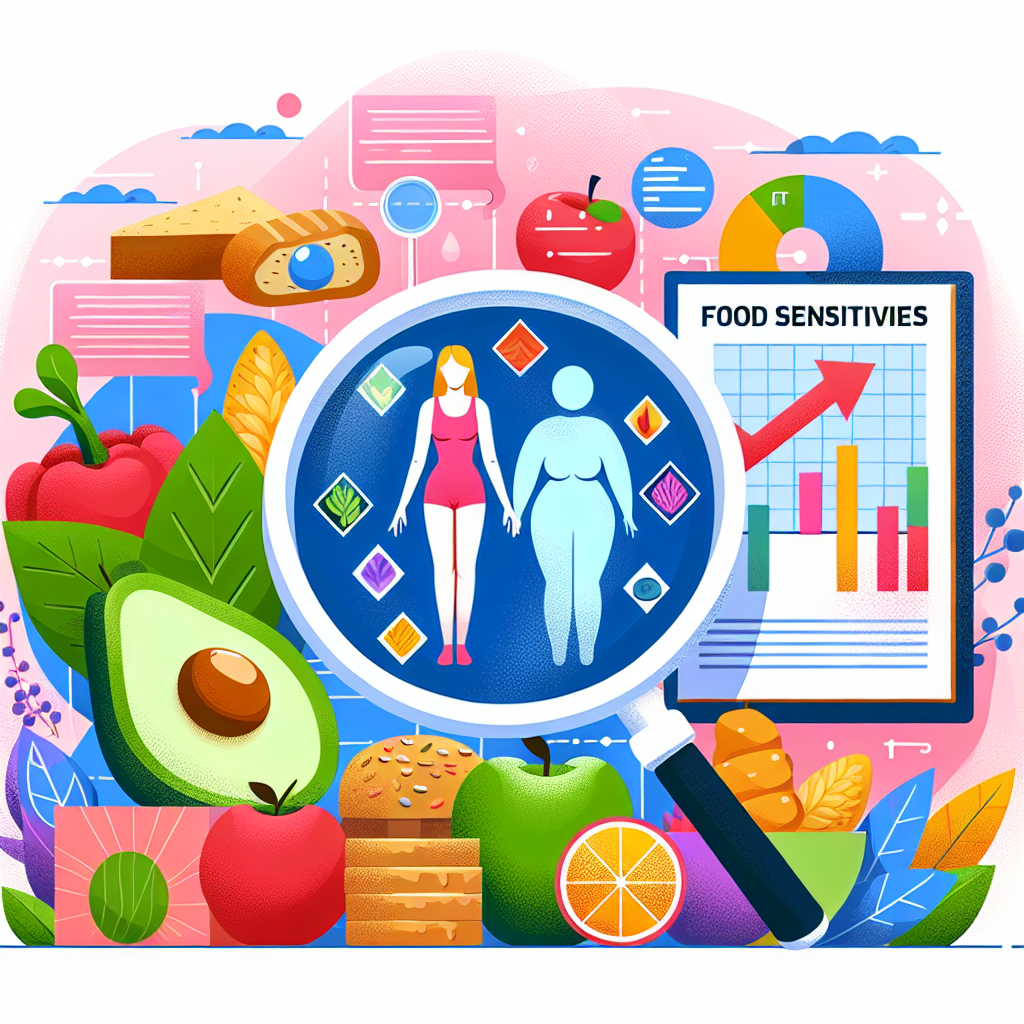Are Food Sensitivities Blocking Your Weight Loss?

Discover if food sensitivities are blocking your weight loss journey. Visit My Vibrant Vitality now to learn more and take control of your health.
Understanding the Link Between Food Sensitivities and Weight Loss
Are Food Sensitivities Blocking Your Weight Loss?
In the quest for weight loss, many people focus on the traditional factors such as diet and exercise. However, there is an often overlooked aspect that could be hindering your weight loss efforts: food sensitivities. Understanding the link between food sensitivities and weight loss can provide a fresh perspective on how to approach your weight loss journey.
Food sensitivities, also known as food intolerances, occur when your body has difficulty digesting certain foods. This is different from food allergies, which involve an immune system response. Symptoms of food sensitivities can range from bloating and stomach pain to headaches and fatigue. These symptoms can occur hours or even days after consuming the offending food, making it difficult to pinpoint the cause.
So, how do food sensitivities relate to weight loss? The answer lies in the body’s inflammatory response. When you consume a food that your body is sensitive to, it can trigger an inflammatory response. This inflammation can lead to water retention and bloating, which can make you feel heavier and affect the number on the scale.
Moreover, chronic inflammation caused by regular consumption of foods you are sensitive to can disrupt your body’s metabolic processes. This disruption can slow down your metabolism, making it harder for you to burn calories and lose weight. In addition, inflammation can affect your body’s insulin response, which can lead to weight gain or difficulty losing weight.
Another way food sensitivities can impact weight loss is through their effect on your gut health. Your gut plays a crucial role in your overall health, including your weight. When you regularly consume foods that you are sensitive to, it can damage your gut lining, leading to a condition known as leaky gut. This condition can lead to further food sensitivities, creating a vicious cycle. Moreover, a damaged gut can affect nutrient absorption and lead to cravings for unhealthy foods, both of which can hinder your weight loss efforts.
So, what can you do if you suspect that food sensitivities are blocking your weight loss? The first step is to identify the offending foods. This can be done through an elimination diet, where you remove potential trigger foods from your diet for a period of time and then gradually reintroduce them, noting any symptoms. Common food sensitivities include dairy, gluten, soy, and eggs, but everyone is unique and you may have sensitivities to other foods.
Once you’ve identified your food sensitivities, the next step is to remove these foods from your diet. This can be challenging, especially if the offending foods are ones you enjoy. However, there are many alternatives available for common food sensitivities, and a registered dietitian can help you navigate this process.
In conclusion, food sensitivities can indeed block your weight loss by causing inflammation, disrupting your metabolism, and damaging your gut health. By identifying and eliminating these foods from your diet, you can reduce inflammation, improve your gut health, and potentially boost your weight loss efforts. Remember, weight loss is a complex process and it’s important to approach it from multiple angles for the best results.
How Food Sensitivities Could Be Hindering Your Weight Loss Journey

Are you struggling to shed those extra pounds despite following a strict diet and exercise regimen? The culprit might be lurking in your daily meals, unbeknownst to you. Food sensitivities could be the invisible barrier hindering your weight loss journey.
Food sensitivities are different from food allergies. While food allergies trigger an immediate immune response, food sensitivities cause a delayed reaction, making them harder to identify. They can lead to inflammation and bloating, which can sabotage your weight loss efforts.
When you consume foods that you are sensitive to, your body perceives them as harmful invaders. This triggers an immune response, leading to inflammation. Chronic inflammation can disrupt the normal functioning of your body’s metabolic system, leading to weight gain or difficulty losing weight.
Moreover, food sensitivities can cause bloating by affecting your gut health. The gut plays a crucial role in weight management. An unhealthy gut can lead to poor nutrient absorption, increased appetite, and weight gain. When you consume foods that you are sensitive to, it can damage your gut lining, leading to a condition known as leaky gut. This can cause bloating and weight gain.
Food sensitivities can also lead to cravings. When you eat foods that you are sensitive to, it can cause a spike in your blood sugar levels, followed by a crash. This can leave you feeling tired and craving more of the same food, leading to overeating and weight gain.
Identifying and eliminating foods that you are sensitive to can be a game-changer in your weight loss journey. The most common food sensitivities include dairy, gluten, eggs, soy, corn, and nuts. However, everyone is unique, and what works for one person may not work for another.
One way to identify your food sensitivities is through an elimination diet. This involves removing certain foods from your diet for a period of time and then reintroducing them one at a time while monitoring your symptoms. This can help you identify which foods are causing problems.
Another way is through food sensitivity testing. This involves taking a blood test to identify which foods your body is reacting to. However, these tests are not always accurate and should be used in conjunction with an elimination diet and under the guidance of a healthcare professional.
Once you have identified your food sensitivities, you can start to eliminate them from your diet. This can help reduce inflammation, improve your gut health, and aid in weight loss. However, it’s important to remember that this is not a quick fix. It takes time for your body to heal and for the inflammation to reduce.
In conclusion, if you’re struggling with weight loss, it might be worth considering whether food sensitivities are playing a part. By identifying and eliminating these foods from your diet, you could potentially overcome the hurdle that’s been holding you back in your weight loss journey. Remember, it’s always best to consult with a healthcare professional before making any major changes to your diet.
Unmasking the Role of Food Sensitivities in Weight Loss Resistance
Are Food Sensitivities Blocking Your Weight Loss?
In the quest for weight loss, many individuals focus on the traditional factors such as diet and exercise. However, there is an often overlooked aspect that could be hindering your weight loss efforts: food sensitivities. These are not to be confused with food allergies, which are severe reactions to certain foods. Food sensitivities, on the other hand, are more subtle and can manifest in various ways, including weight loss resistance.
Food sensitivities occur when your body has a negative reaction to certain foods. This reaction is typically caused by an inability to properly digest or absorb these foods, leading to inflammation in the body. Inflammation, in turn, can lead to weight gain or difficulty losing weight. This is because inflammation can disrupt the normal functioning of your metabolism, causing your body to store fat rather than burn it for energy.
Moreover, food sensitivities can also lead to cravings for the very foods that are causing the problem. This is because when your body reacts negatively to a food, it can trigger a stress response. This stress response can then lead to cravings for comfort foods, which are often high in sugar and fat. As a result, you may find yourself in a vicious cycle of eating foods that cause inflammation, leading to weight gain, and then craving more of these foods.
So, how can you determine if food sensitivities are blocking your weight loss? One way is through an elimination diet, where you remove certain foods from your diet for a period of time and then gradually reintroduce them to see how your body reacts. Common foods that cause sensitivities include dairy, gluten, soy, and eggs. However, everyone is unique, and what causes a reaction in one person may not cause a reaction in another.
Another way to identify food sensitivities is through testing. There are various tests available that can help identify food sensitivities, including blood tests and stool tests. These tests can provide a more detailed picture of what foods may be causing inflammation in your body. However, it’s important to note that these tests are not always 100% accurate and should be used in conjunction with other methods, such as an elimination diet.
Once you’ve identified your food sensitivities, the next step is to remove these foods from your diet. This can be a challenging process, as it often involves changing long-standing eating habits. However, with patience and persistence, it is possible to create a diet that supports your weight loss goals while also reducing inflammation in your body.
In conclusion, food sensitivities can play a significant role in weight loss resistance. By identifying and addressing these sensitivities, you can break the cycle of inflammation and cravings, making your weight loss journey smoother and more successful. Remember, weight loss is not just about counting calories or hitting the gym; it’s also about understanding how your body reacts to the foods you eat. By taking a holistic approach to weight loss, you can achieve your goals and improve your overall health.